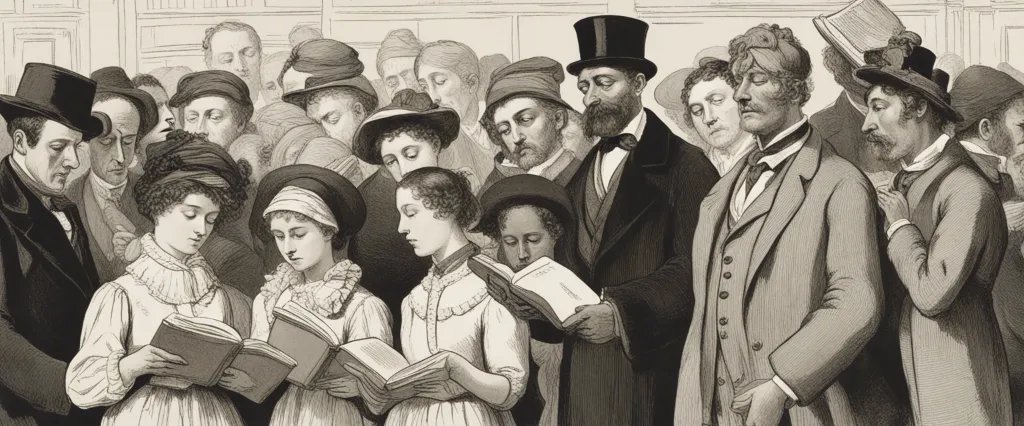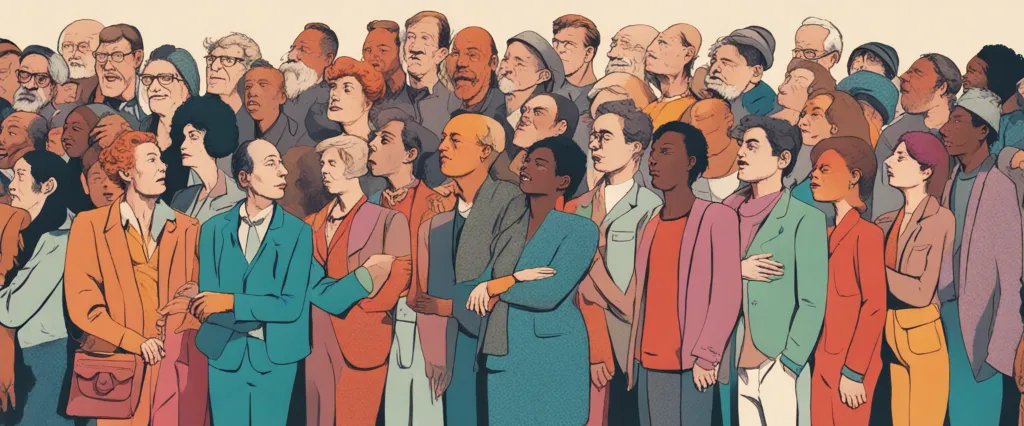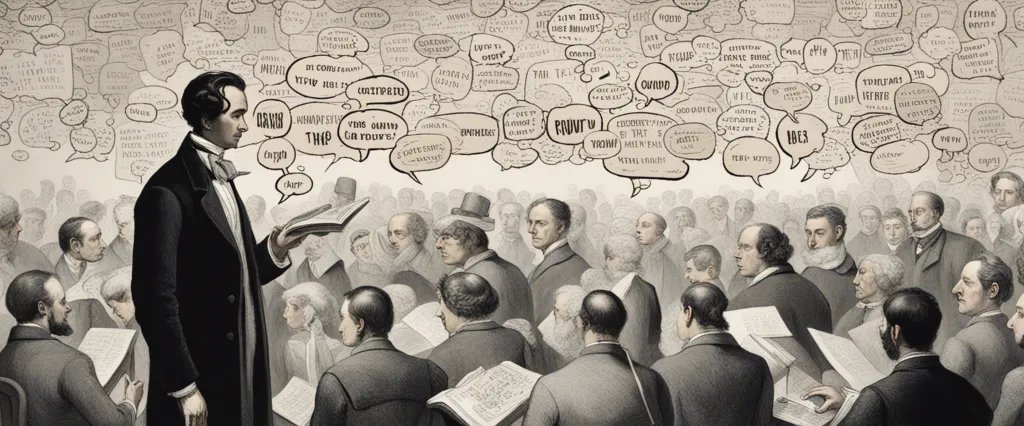The Crowd: A Brief Overview of Gustave Le Bon's Influential Work

 Chapter 1 What's the The Crowd
Chapter 1 What's the The Crowd
"The Crowd: A Study of the Popular Mind" is a book written by Gustave Le Bon, a French social psychologist, in 1895. It explores the psychology and behavior of crowds and their impact on individuals and society. Le Bon analyzes the characteristics of crowds, such as their emotional intensity, irrationality, and tendency to lose individuality and become immersed in a collective mindset. He also examines the influence of leaders on crowd behavior and the potential for both positive and negative outcomes when crowds gather. Le Bon's work has been influential in the fields of sociology, psychology, and political science, shaping theories on mass psychology and crowd dynamics.
Chapter 2 Is the The Crowd recommended for reading?
The book "The Crowd: A Study of the Popular Mind" by Gustave Le Bon is often considered a significant and influential work in the field of social psychology. Published in 1895, it explores the dynamics of crowds and how individuals behave differently when part of a larger group, emphasizing the irrational and emotional nature of crowd behavior.
While it is widely acknowledged as a groundbreaking work, it is important to note that the book has faced criticism due to its outdated views, generalizations, and lack of empirical evidence. Le Bon's conclusions are primarily based on his personal observations and experiences, which may limit its validity in the eyes of some contemporary readers.
Moreover, the book has been criticized for its potentially dangerous implications that suggest a loss of individuality and autonomy in groups, reinforcing negative stereotypes about crowd behavior. It is seen by some as promoting elitism and an undervaluation of democratic principles.
Therefore, whether "The Crowd" is considered a good book depends on the individual reader's interests and perspective. It remains a significant piece of historical literature on the topic of crowd behavior, but it should be read critically, taking into account its historical context and limitations.
Chapter 3 the The Crowd Summary
"The Crowd" by Gustave Le Bon is a seminal work in the field of sociology and psychology. Published in 1895, the book explores the behavior and psychology of crowds. Le Bon argues that when individuals come together in a crowd, they lose their individuality and rationality, succumbing instead to a primitive and irrational mindset.
Le Bon begins by discussing the characteristics of crowds, noting that they are impulsive, emotional, and easily influenced. He examines the role of leaders in influencing crowds and asserts that these leaders must be able to tap into the collective unconscious of the crowd to effectively manipulate them.
Le Bon also explores the idea that the collective mind of a crowd is much weaker and less capable of reasoning than the individual minds that comprise it. This loss of rationality in crowds can lead to a susceptibility to suggestion and manipulation by demagogues or mass movements.
The book goes on to examine various historical events and revolutions, such as the French Revolution and the rise of Christianity, to illustrate how crowds can be manipulated and controlled by influential leaders.
Le Bon also delves into the concept of crowd psychology, discussing how crowd behavior is shaped by social and psychological factors. He argues that crowds possess a collective intelligence that is distinct from the intelligence of individuals, often leading to actions and behaviors that individuals would not engage in on their own.
Overall, "The Crowd" provides a comprehensive analysis of the psychology of crowds, exploring their characteristics, behaviors, and susceptibility to manipulation. It offers valuable insights into the power of collective psychology and its impact on society.
Chapter 4 Meet the Writer of the The Crowd
The book "The Crowd: A Study of the Popular Mind" was written by Gustave Le Bon, a French social psychologist, sociologist, and physician. It was first published in 1895 in French, with the original title "Psychologie des Foules." The English translation was published in 1896.
Gustave Le Bon is best known for his work on crowd psychology, which explores the behavior of individuals when they are part of a larger group. "The Crowd" is considered his most significant and influential work, as it laid the foundation for understanding the collective behavior of crowds and the impact of societal factors on individuals.
Apart from "The Crowd," Gustave Le Bon has written several other books. Some of his notable works include:
- "The Psychology of Revolution" (1895): In this book, Le Bon examines the psychological factors and patterns behind revolutions and societal change.
- "The Evolution of Forces" (1907): Le Bon explores the concept of force in different areas, including biology, sociology, and human behavior.
- "The Psychology of Peoples" (1921): This work delves into the collective psychology and mental characteristics of different nations and ethnicities.
- "The World in Revolt" (1920): Le Bon analyzes the global political atmosphere after World War I, discussing the rise of revolutions, democratic movements, and emerging nationalist sentiments.
In terms of editions and popularity, "The Crowd" remains Gustave Le Bon's most renowned work. It has been widely translated into numerous languages and has gone through several editions. However, it is important to note that there is no definitive "best" edition, as newer editions may have updated introductions, annotations, or translations. To find the most suitable edition, it's recommended to consult reputable publishers and compare reviews for each edition available in your preferred language.
Chapter 5 the The Crowd Meaning & Theme
the The Crowd Meaning
"The Crowd" by Gustave Le Bon is a book that explores the psychology and behavior of crowds. Published in 1895, it examines how individuals lose their individuality and rationality when they become part of a group.
Le Bon argues that when people are part of a crowd, they are more likely to engage in impulsive and irrational behavior. He suggests that the collective mind of the crowd becomes more emotional and susceptible to manipulation, often leading to destructive actions. According to Le Bon, crowds tend to operate on a lower level of intelligence and morality than the individuals within them.
The book also explores the power of suggestion and how leaders or influential figures can easily manipulate a crowd for personal gain. Le Bon suggests that it is the leader's ability to tap into the emotions and desires of the crowd that allows them to control and influence their actions.
Overall, Le Bon's main message in "The Crowd" is that when individuals become part of a crowd, they lose their individuality, rationality, and sense of responsibility. This loss of individuality can lead to both positive and negative outcomes, depending on the leadership and circumstances surrounding the crowd.
the The Crowd Theme
The main theme of "The Crowd" by Gustave Le Bon is the study of the psychology and behavior of masses. Le Bon examines the characteristics and actions of crowd behavior, exploring topics such as the irrationality, impulsivity, and suggestibility of individuals when they are part of a larger group.
One of the central ideas in the book is that individuals lose their rationality and critical thinking when they become part of a crowd. Le Bon argues that the crowd operates on a collective mind that is driven by emotions, instincts, and impulses rather than reasoned thought. He suggests that this temporary transformation of individuals into a crowd member leads to a loss of inhibitions and a susceptibility to contagion-like behavior.
Another key theme in "The Crowd" is the power of suggestion and the influence of leaders on the behavior of crowds. Le Bon argues that charismatic leaders have the ability to sway the emotions and actions of the crowd through their persuasive techniques. These leaders are often able to tap into the shared beliefs, fears, and desires of the crowd, manipulating them for their own purposes.
Additionally, the book explores the idea that the behavior of crowds can be unpredictable and even dangerous. Le Bon highlights numerous historical examples of mob violence and irrational crowd behavior, demonstrating the potential for mass hysteria and the emergence of destructive tendencies when large numbers of people gather together.
Overall, the theme of "The Crowd" centers on the understanding of the psychological dynamics of crowds and their impact on individual behavior. Le Bon's examination of crowd psychology serves to provide insight into the formation and actions of large groups of people, shedding light on the complexities of human behavior in collective settings.
Chapter 6 Various Alternate Resources
- Books: "The Crowd: A Study of the Popular Mind" by Gustave Le Bon is available in bookstores and online platforms like Amazon and Barnes & Noble.
- E-books: Many online platforms offer e-book versions of "The Crowd" that can be downloaded and read on e-readers or mobile devices.
- Audiobooks: Platforms like Audible and Google Play Books have audiobook versions of "The Crowd" for those who prefer listening to the book.
- Online Articles: Many online publications, like The New York Times or The Guardian, have articles discussing the influence and relevance of Gustave Le Bon's work on crowd psychology.
- Scholarly Journals: Academic databases like JSTOR or Google Scholar provide access to scholarly articles and research papers that analyze various aspects of "The Crowd."
- Podcasts: There are podcasts focused on psychology, history, or philosophy that have episodes dedicated to discussing the themes and ideas in "The Crowd."
- Documentary Films: Numerous documentaries on the history of mass psychology and crowd behavior may reference Gustave Le Bon and his book.
- Online Forums and Discussion Boards: Online platforms like Reddit or Quora often have forums or threads where readers can discuss and exchange ideas about "The Crowd."
- YouTube Videos: Many YouTubers create videos explaining and analyzing the concepts in "The Crowd" from different perspectives, offering a visual and auditory alternative to reading the book.
- Social Media: Following relevant hashtags or accounts on platforms like Twitter, Instagram, or LinkedIn can lead to posts and discussions about Gustave Le Bon and "The Crowd" by interested individuals or organizations.
Chapter 7 Quotes of the The Crowd
The Crowd book quotes as follows:
- "The masses have never thirsted after truth. They turn aside from evidence that is not to their taste, preferring to deify error if error seduces them."
- "The greater the number of individuals in a crowd, the more quickly it tends to lose contact with the rational side of its members."
- "In the ordinary course of everyday life, the influence of the crowd is almost irresistible."
- "Crowds are only powerful for destruction. Their rule is always tantamount to a reign of terror."
- "Crowds do not reason. They do not foresee consequences. They do not think at all in the ordinary sense of the word."
- "The moment two beings enter into relationship with one another, a psychological phenomenon which may be termed suggestion is produced."
- "The racial unconscious is a mysterious entity. It forces individuals to behave in ways beyond their conscious control."
- "Man becomes kind of an automaton when he joins a crowd. He loses his individuality and behaves according to the collective will."
- "Only by mastering the psychology of the crowd can we hope to understand and control its irrational behavior."
- "The most striking peculiarity of a crowd is its intellectual incapacity, the very things that distinguish it from other gatherings."
Chapter 8 Books with a Similar Theme as the The Crowd
Title: Dive into New Realities: Must-Read Books After "The Crowd"
- "1984" by George Orwell:
After immersing yourself in "The Crowd," George Orwell's "1984" becomes an essential read. Similar to Huxley's "Brave New World," Orwell's masterpiece explores the dangers of a dystopian society. Featuring a totalitarian regime, constant surveillance, and the suppression of individuality, the book offers a chilling critique of authoritarian rule and the manipulation of reality.
- "Brave New World" by Aldous Huxley: A chilling dystopian novel that paints a vivid picture of a future society where individuality and freedom are sacrificed for stability and uniformity. Huxley's work serves as a cautionary tale, confronting readers with thought-provoking questions about technology, humanity, and societal control. Prepare to be drawn into an unsettling world that offers profound reflections on our own reality.
- "Animal Farm" by George Orwell:
Another captivating work by George Orwell, "Animal Farm" uses allegory to depict the corruption of power and the dangers of totalitarianism. The story follows the revolt of farm animals against their human oppressors, only to witness their revolution slowly being co-opted by the ruling pigs. Orwell's thought-provoking novella serves as an allegory for the Russian Revolution and its aftermath.
- "The Handmaid's Tale" by Margaret Atwood:
Margaret Atwood's haunting dystopian novel, "The Handmaid's Tale," presents a society where women are subjected to oppression and control. Set in the Republic of Gilead, the book follows Offred, a handmaid forced into sexual servitude. This powerful and timely narrative highlights the importance of reproductive rights and the dangers of extreme religious fundamentalism.
- "Station Eleven" by Emily St. John Mandel:
Stepping away from dystopian societies, "Station Eleven" by Emily St. John Mandel depicts a post-apocalyptic world devastated by a pandemic. Blending elements of humanity's resilience with a gripping plot, the novel explores the interconnectedness of people and how art can provide solace and hope in the face of unimaginable circumstances.
These five thought-provoking books offer a diverse range of perspectives on dystopian societies, oppressive regimes, and the value of freedom. After delving into "The Crowd" by Gustave Le Bon, these works will continue to challenge your perceptions of human behavior, power dynamics, and the potential consequences of societal momentum.




